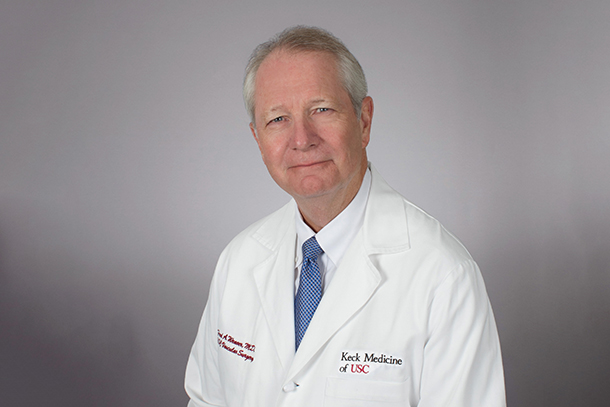On April 24, Fred Weaver, MD, MMM, professor of surgery at the Keck School of Medicine of USC and chief of the division of vascular surgery, formally took over as chief of staff for Keck Hospital of USC. As such, he will be the communication nexus between staff and executive administration, as well as provide leadership during the next phase of development at Keck Medicine of USC.
He recently spoke with HSC News about his work and personal interests.
What does being Chief of Staff mean for you?
It is an honor and a privilege and very exciting — this is a crucial time in the development of Keck Medical Center. It is great to be part of the organization and to be able to play a part in what is going to happen.
What got you interested in vascular surgery?
I was a third-year medical student here at USC and I had absolutely no idea what I would do. I rotated on the general surgery service and I just loved the fact that you comprehensively took care of the patient, both medically and surgically.
I did five years of general surgery and then, while I was doing that residency, I was really attracted to vascular surgery. There are many medical aspects of vascular surgery — I enjoy medicine — and you have an opportunity to operate pretty much all over the body. I liked the fact that it is a technically challenging specialty. There is a great deal of fine detail and it is a specialty where, if you do not do it right the first time, you’re going to have immediate feedback that something is wrong. You really have to learn how to do it right the first time. The patients are in general are an at-risk population because of their illnesses — diabetes, smoking-related illnesses, high cholesterol — so they cannot tolerate missteps. I like the forced precision of vascular surgery: you need to do it right the first time.
What advice would you give to medical students considering a career in surgery?
Number one is, the patient has to come first. Contrary to a frequent theme in medical education, your own quality of life is a secondary concern. If your quality of life is getting in the way of the patient’s welfare, then you should not be a surgeon. It is also true for doctors in many other medical specialties: There’s a sacrificial aspect to medicine. Not that quality of life is not important, but if you want to have a great deal of personal freedom, just don’t be a doctor. You have patients who are depending on you. You have to be willing to put your needs second to the patient’s welfare.
More practically, you have to like working with both your hands and mind. Medicine is a detective game. Surgery adds a physical component. In the end, the most important thing is that if you want to become a surgeon, you have to have a passion for it.
Speaking of quality of life, you’re a grandfather of two?
Almost three! I have three sons and two grandsons, one who is two and a half, and one who just turned 1, and a granddaughter on the way. The 2-year-old-is hitting the phase where he is babbling a lot — his mom has to translate for me, but sometimes I can pick up what he’s trying to say.
And in your spare time from all that, you enjoy reading about history?
I like history – especially biographies of great men and women.
Who is your favorite figure from history?
Jesus Christ would be foremost, since in my worldview, he is the center of history with a life unlike any other. Another would be Winston Churchill. Churchill was a unique character. He was a very gifted politician, a great writer and very charismatic, but he also rubbed many people the wrong way. He was marginalized during the prime of his career, and predominantly because of his negative opinion of Adolf Hitler. He warned that Britain and France needed to stand up to him, not just appease him. He was very critical of Neville Chamberlain and the appeasement that went on in the 1930s. And then, like Tiger Woods, 10 years later, he was back and running the show! I absolutely believe that without him the world we have today would be a very different place.
Do you have a favorite historic era to read about?
Well, I just finished reading Peter the Great. Peter the Great was a remarkable person, and provides great insight into Russia then and now. Robert Massey wrote the book in 1981, when the Soviet Union was alive and well. I wonder what his thoughts would be on Russia as it is now. One consistent theme of Russia as best as I can tell is a dominant leader and a small group of insiders who run the show, whether it is Putin with oligarchs or a Tsar with Russian nobles. Russia has always had one dominant leader and a small group, the Politburo or whatever, that runs that country. Always.
I also just finished a biography of Napoleon. My wife and I went to Venice a couple of years ago and as we were going into Venice on one of the water taxis, the driver pointed out Cemetery Island, which Napoleon created. I thought, “What was Napoleon doing in Venice?” I later found out that when he controlled Venice, he dug up all the graves in Venice and buried them on this one island.
So I thought, “I have to find out what this guy is about!” He’s another amazing character. And he also, like Hitler, destroyed his army when attempting to conquer Russia.
— Lex Davis


